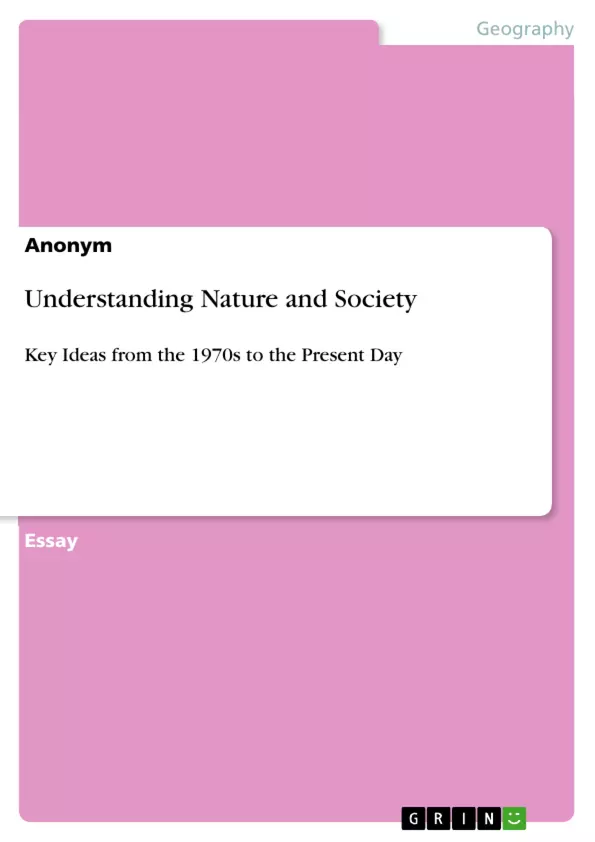In this essay, a specific timeline, beginning from the 1970s to the present day, that traces the emergence and development of various theories, themes and concepts in the strand of Nature and Society will be discussed. While the timeline may appear to present a linear, chain-like trajectory to the study of nature and society relations in human geography, it is crucial to note that there is no singular definition that can account for all works associated with one theory, say, actor-network theory; and no singular theory that dominates the academic debates entirely at any time. Instead, what are present are gradual emergences of theories that maintain dialectical relations with pre-existing theories, often critiquing, shaping and influencing one another. For example, cultural ecology, which pre-dates political ecology and actor-network theory, is seen to share some resemblance with the latter (Braun, 2007: 151), and continues to be an approach used by some contemporary human geographers.
Table of Contents
- Introduction to the Timeline
- 1970s – 1980s
- Context: Birth of the Environmental Protection Agency, the Montreal Protocol (Ozone Depletion), Brundtland Commission.
- The Emergence of Political Ecology
- Elements of Political Ecology in the 1970s and 80s
- 1990s
- Context: Persian Gulf War, Three Gorges Dam, 'Sustainable Environment' Initiatives, First Issue of the Journal of Global Environmental Change.
- Shifting Political Ecology and "Cultural Studies of the Environment"
- Postmodern and Poststructural 1990s
- Global Narratives
Objectives and Key Themes
This essay examines the development of geographic thought, specifically focusing on theories, themes, and concepts within the "Nature and Society" strand from the 1970s to the present. It traces the gradual emergence and development of key theories, demonstrating their interrelationships and influences, while highlighting the ongoing dialogue and critiques within the field.
- The emergence and evolution of political ecology.
- The impact of the "cultural turn" on political ecology.
- The role of postmodern and poststructural ideas in reshaping geographic thought.
- The shift in focus from environmental issues in rural areas to urban and industrial settings.
- The significance of global narratives and "sustainable development" in shaping contemporary environmental discourse.
Chapter Summaries
The essay begins by introducing the timeline and emphasizing the dynamic nature of geographic thought. It then focuses on the emergence of political ecology in the 1970s and 1980s, highlighting its origins and key thinkers. The chapter explores how political ecology challenged earlier perspectives and emphasized the political dimensions of environmental issues. It also discusses the influence of cultural ecology on the development of political ecology and the importance of understanding the interplay of social structures, power dynamics, and environmental degradation.
The chapter on the 1990s explores the impact of the "cultural turn" on political ecology, focusing on the emergence of post-Marxist and poststructuralist approaches. The essay examines how these new perspectives broadened the scope of political ecology to include cultural studies of the environment, highlighting the importance of analyzing representations, discourses, and social constructions of nature.
The essay concludes by discussing the rise of global narratives, emphasizing the growing concern with environmental problems at a global scale. It highlights the role of "sustainable development" and the influence of Foucauldian approaches in analyzing environmental discourse. The chapter also underscores the importance of studying environmental change in a historical and political context.
Keywords
This preview focuses on the evolution of geographical thought, particularly concerning "Nature and Society" relationships. Key concepts include political ecology, cultural ecology, post-Marxist thought, poststructuralism, cultural studies of the environment, sustainable development, and global environmental change. The essay highlights the interrelationships between these concepts, emphasizing the dynamic and evolving nature of geographic research.
- Citation du texte
- Anonym (Auteur), 2008, Understanding Nature and Society, Munich, GRIN Verlag, https://www.grin.com/document/129168



